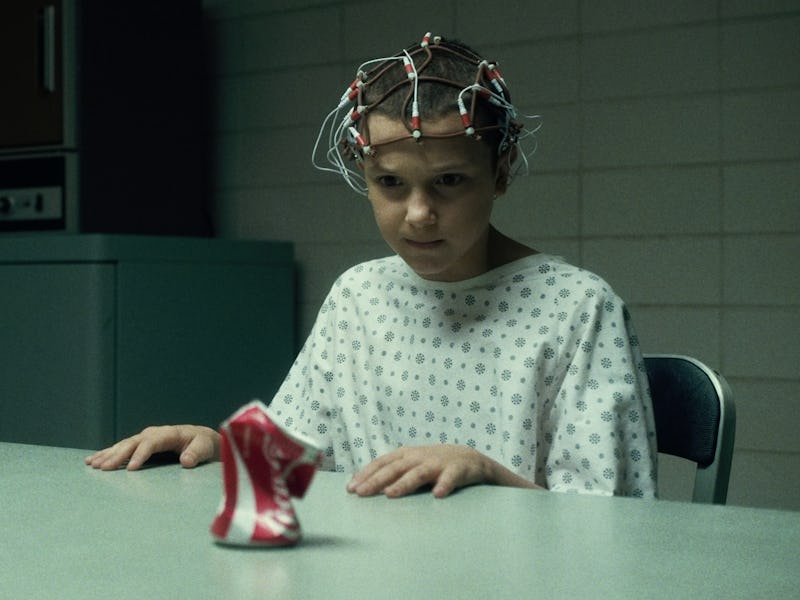'Stranger Things' Ups the Cred of Netflix's Original Series
'Stranger Things' is as safe a bet as any Netflix show. But it exceeded expectations in an important way.

The results are in: Most people seem to agree that Stranger Things, the Duffer Brothers’ throwback sci-fi fable, is one of the best pieces of original programming that Netflix has yet mounted.
Stranger Things is both emblematic of the promise of the streaming service’s expansive original-programming platform and its saturating, calculated, cover-every-base business model. That is: Stranger Things is more satisfying than most any show the network has mounted — I’ll discount films and documentary series for the moment — but adheres to its basic premise of by-the-numbers professionalism.
Stranger Things is a guaranteed win, and it must have seemed so on-paper. IT’s tautly constructed, satisfying plot-wise, paced perfectly, contracting just enough star power (resurrecting Winona Ryder is enough for many) to lure subscribers into sampling it in the first place. In its overall schemata, it fits the general Netflix model of another addictive genre experiment.
Other notable examples of this kind of successful Netflix show have been Jessica Jones — with a conceit to rope in both comic book aficionados and agnostics alike; the Apatow-ian comfort food of Love; the woke, star-driven Aziz Ansari comedy Master of None; and trendy cartel drama Narcos. All of these shows feel crowd-tested for bingeability, and fit aptly into one of the specific recommended categories into which the service carefully divides its content.
These are only a few in what is an increasingly dense sea of Netflix-branded shows, including interesting entries the service acquired from Channel 4 and the BBC for global distribution. These are some of the service’s best offerings: among them, the more-than-excellent Happy Valley (go watch it), the Stellan Skarsgard-starring schitzo-procedural River, and popular Gillian Anderson/Jamie Dornan procedural The Fall.
Netflix’s approach is the epitome of the ethos of peak TV: Theres a show for everyone, and they are all at least okay. Stranger Things fits with the approach: It’s catered toward the cult film and ‘80s sci-fi zealot, and is diplomatic enough to rope in non-believers as well.
Even Netflix’s content chief Ted Sarandos admitted today, in a Television Critics Association panel, that some of the service’s original programming is definitely better than others. The subscription model, according to Sarandos, means that ratings really don’t influence their programming choices; attacking from all sides is the best approach, whether it’s a new Adam Sandler film or another season of a tried-and-true, addictive watercooler show like Orange is the New Black.
In this context, today’s news that — along with the Maria Bamford comedy Lady Dynamite and Chelsea Handler’s talk show Chelsea — Netflix is also renewing Rob Schneider’s post-Louie, self-funded disaster zone Real Rob makes a bit more sense. Why not?
For other streaming services, the approach is a bit different: The offerings are simultaneously more selective and more variegated. These days, Amazon Studios is taking a more throw-everything-at-the-wall approach, working to green-light more shows rather than testing through voting pilots in or out. But they also favor experimental, less easily characterizable characterizable material that seems interesting rather than attempting to crowd every possible genre market.
The tone of experiments like Mozart in the Jungle, the discontinued bro-misadventure action-comedy Mad Dogs, and oddball procedural Bosch is more jumbled and less linear than something like Stranger Things. Mozart in the Jungle is a screwball-comedic character study subverting clear conflict at every turn. Mad Dogs goes from Very Bad Things to, effectively, a meandering Jim Jarmusch movie in just a couple of episodes.
Amazon — a giant, hydra-headed corporation — has less financial pressure than Netflix to keep people over-satiated with exclusive content to drive up and retain subscription numbers. They, as a result, are building more credibility with daring filmmakers, even if the movies don’t rake in huge profits; Woody Allen, Spike Lee, Todd Solondz, Whit Stillman, and others are all teaming up with Amazon to get creative control.
Hulu has had far less success with any zeitgeist show, but is still experimenting, green lighting everything from Leftovers-esque cult drama The Path to Steven King adaptations. If Amazon has the freedom to branch out and pursue renowned artists’ passion projects, Hulu is just trying to figure out where they fit in.
With Stranger Things, Netflix has made one of its most definitive jumps beyond safe just-okayness, though the show is still perfectly and tautly poised for success, with scares, twists, and appropriately odd visual mise-en-scenes. One hopes that the service will continue to double down on making series like this that are at least memorable, even if they are not 100% daring or particularly innovative. It’s certainly time to taper off some of the phoned-in stocking stuffers — Special Correspondents, Flaked, and the like.
Yet if Sarandos’s comments today indicate anything, it’s that Netflix may have to continue to pad out its lineup for at least a while. Subscriber rates are flagging compared to expectations, and the company’s stock is suffering as a result.
If anything, the quantity of Netflix originals is just nerve-racking. It makes the sense that TV is a bet headed toward utter dubble cruising for a bursting more acute. Programming like Stranger Things gives us back an ounce of faith in the industry. Let’s hope Netflix manages to crank out more material on its level, for both our sake and theirs.